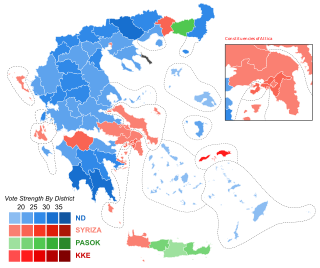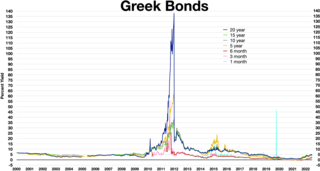| ||
|---|---|---|
First term Second term
First term
Second term | ||
Following the January 2015 Greek election, the leader of the largest party SYRIZA, Alexis Tsipras, was charged with forming a coalition government.
| ||
|---|---|---|
First term Second term
First term
Second term | ||
Following the January 2015 Greek election, the leader of the largest party SYRIZA, Alexis Tsipras, was charged with forming a coalition government.
DIMAR MP and member of the central committee of DIMAR, Spyros Lykoudis, stated his preference for a broader SYRIZA-DIMAR-PASOK coalition. [1]
Panos Kammenos, leader of Independent Greeks (ANEL) stated he favored a broad alliance of anti-bailout parties, excluding Golden Dawn. [2] Following the rumors of a third bailout, Kammenos attempted to convince maverick ND and PASOK MPs to bring down the government. [2]
Dimitris Koutsoumpas, leader of the Communist Party (KKE), reiterated the party's stance against cooperation with other parties, stating alliances or partnerships must be done in terms of social movements, "not from the top down, where leaders sit down and find, one, two, three things they agree on and sign a program. Those alliances have been shown to have many bad side effects for the labour movement." [3] [4]
Bloomberg Businessweek suggested that SYRIZA's choice for coalition partner would reveal its intentions toward negotiations with the Troika. If SYRIZA forms the government with The River, then it could "signal that Tsipras wants to avoid a showdown with the troika lenders" as [To Potami leader Stavros] "Theodorakis strongly opposes such a confrontation and says he wouldn't partner with Syriza unless Tsipras promised to keep Greece in the euro currency". [5] If SYRIZA partners with Independent Greeks, it shows a desire to fight with the Troika, given the parties shared anti-austerity ideology. [5] However, that is the only policy that the two parties share.
Shortly after the election, Stavros Theodorakis, leader of The River, was expected to meet with Alexis Tsipras in the next 48 hours. [6] However, on 26 January 2015, Tsipras and Independent Greeks leader Panos Kammenos surprisingly agreed to form an "anti-austerity coalition". Yanis Varoufakis, expected to be appointed Minister of Finance, said they would "come to Frankfurt and Berlin and Brussels with [...] a plan to minimise the cost of that Greek debacle to the average German. We must be very careful not to toy with fast or loose talk of Grexit. Grexit is not on the cards." [7]
This section needs to be updated.(February 2015) |
As of 26 January, the written government formation agreement between ANEL and Syriza - outlining policies and the working program of the government - was yet to be announced. The list below feature the most important pledges made by Syriza in its election campaign, as it is expected all of them will be adopted without any change by the government agreement:

The Coalition of the Radical Left – Progressive Alliance, best known by the syllabic abbreviation SYRIZA, is a left-wing political party in Greece. It was founded in 2004 as a political coalition of left-wing and radical left parties, and registered as a political party in 2012.

Alexis Tsipras is a Greek politician serving as Leader of the Official Opposition since 2019. He served as Prime Minister of Greece from 2015 to 2019.

Democratic Left was a social-democratic political party in Greece. Formed as a split from Synaspismós, DIMAR was a minor party supporting the Samaras cabinet from 21 June 2012 to 21 June 2013. After being a member of the Democratic Alignment (DIMAR) and the Movement for Change (KINAL), it affiliated to Syriza in 2019. The party was dissolved in 2022.

Ioannis "Yanis" Varoufakis is a Greek economist and politician. A former academic, he served as the Greek Minister of Finance from January to July 2015 under Prime Minister Alexis Tsipras. He has been Secretary-General of MeRA25, a left-wing political party, since he founded it in 2018. A former member of Syriza, Varoufakis was a member of the Hellenic Parliament for Athens B from January to September 2015; he regained a parliamentary seat in July 2019.

Legislative elections were held in Greece on Sunday, 6 May 2012 to elect all 300 members to the Hellenic Parliament. It was scheduled to be held in late 2013, four years after the previous election; however, an early election was stipulated in the coalition agreement of November 2011 which formed the Papademos Cabinet. The coalition comprised both of Greece's traditional major political parties, PASOK on the left and New Democracy (ND) on the right, as well as the right-wing Popular Orthodox Rally (LAOS). The aim of the coalition was to relieve the Greek government-debt crisis by ratifying and implementing decisions taken with other Eurozone countries and the International Monetary Fund (IMF) a month earlier.

The Independent Greeks - National Patriotic Alliance is a national-conservative political party in Greece.

Legislative elections were held in Greece on Sunday, 17 June 2012, to elect all 300 members to the Hellenic Parliament in accordance with the constitution, after all attempts to form a new government failed following the May elections. If all attempts to form a new government fails, the constitution directs the president to dissolve a newly elected parliament, and then to call for new parliamentary elections within 30 days of the dissolution. The president announced at 16 May the date for the new election, and signed the formal decree to dissolve the parliament and call for the election at 19 May.
The Greek government formation of May 2012 was a series of failed attempts to form a new government after the legislative election in May 2012 by the three largest parties: New Democracy (centre-right), Coalition of the Radical Left and Panhellenic Socialist Movement, respectively, and then followed by the President of Greece. After the negotiations led by the president had failed on 15 May, a temporary caretaker cabinet under Council of State president Panagiotis Pikrammenos was appointed on 16 May, and a new election was set for 17 June.
A Greek withdrawal from the eurozone was a hypothetical scenario, debated mostly in the early to mid 2010s, under which Greece would withdraw from the Eurozone to deal with the Greek government-debt crisis of the time. This conjecture was given the nickname "Grexit", a portmanteau combining the English words 'Greek' and 'exit', and which has been expressed in Greek as ελλέξοδος. The term "Graccident" was coined for the case that Greece exited the EU and the euro unintentionally. These terms first came into use in 2012 and have been revitalised at each of the bailouts made available to Greece since then.

Legislative elections were held in Greece on Sunday 25 January 2015 to elect all 300 members to the Hellenic Parliament in accordance with the constitution. The election was held earlier than scheduled due to the failure of the Greek parliament to elect a new president on 29 December 2014.
European Parliament elections were held in Greece on 25 May 2014 to elect the 21 Greek members of the European Parliament. The number of seats allocated to Greece declined from 22 to 21, as a result of the 2013 reapportionment of seats in the European Parliament.

The Greek government-debt crisis began in 2009 and, as of November 2017, was still ongoing. During this period, many changes had occurred in Greece. The income of many Greeks has declined, levels of unemployment have increased, elections and resignations of politicians have altered the country's political landscape radically, the Greek parliament has passed many austerity bills, and protests have become common sights throughout the country.
The Third Economic Adjustment Programme for Greece, usually referred to as the third bailout package or the third memorandum, is a memorandum of understanding on financial assistance to the Hellenic Republic in order to cope with the Greek government-debt crisis.

Following his victory in legislative elections held on 25 January 2015, the newly elected Prime Minister Alexis Tsipras appointed a new cabinet to succeed the cabinet of Antonis Samaras, his predecessor. A significant reshuffle took place on 17 July 2015.

Euclid Stefanou Tsakalotos is a Greek economist and politician who was Minister of Finance of Greece from 2015 to 2019. He is also a member of the Central Committee of Syriza and has represented Athens B in the Hellenic Parliament since May 2012.

A referendum to decide whether Greece should accept the bailout conditions in the country's government-debt crisis proposed jointly by the European Commission (EC), the International Monetary Fund (IMF) and the European Central Bank (ECB) on 25 June 2015 took place on 5 July 2015. The referendum was announced by Prime Minister Alexis Tsipras in the early morning of 27 June 2015 and ratified the following day by the Parliament and the President. It was the first referendum to be held since the republic referendum of 1974 and the only one in modern Greek history not to concern the form of government.
Olga-Nadia Valavani is a Greek politician and economist. She was appointed to the role of Alternate Minister of Finance in the cabinet of Alexis Tsipras on 27 January 2015. She resigned from this role on 15 July 2015, before a significant vote on the terms of a bailout package in the Hellenic Parliament.

The Second Cabinet of Alexis Tsipras was sworn in on 23 September 2015, following the Greek legislative election in September 2015. Alexis Tsipras, leader of Syriza, was sworn in as Prime Minister of Greece on 21 September, having agreed to re-form the coalition with Panos Kammenos and the Independent Greeks.
Dimitris Kammenos is a Greek politician who served for less than one day as Deputy Minister of Infrastructure, Transport and Networks in the Second Tsipras Cabinet.

Adults in the Room is a 2019 French-Greek political film directed by Costa-Gavras. It is based on the book Adults in the Room: My Battle with Europe's Deep Establishment by Yanis Varoufakis about the 2015 Greek bailout. It is Gavras' first feature film that was shot in Greece.